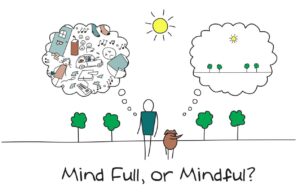
Eventually, In today’s fast-moving world, stress has become an almost ever-present part of our daily life. Consequently, many individuals are seeking effective strategies to manage and reduce stress. One such approach that has garnered significant attention is mindfulness. This article delves into the role of mindfulness in stress reduction, examining its principles, benefits, and real-world applications.
Understanding Mindfulness
Mindfulness can be defined as the practice of paying purposeful attention to the present moment without labelling experiences as good or bad. It involves observing one’s thoughts, feelings, and bodily sensations with openness and acceptance. Individuals can obtain a greater understanding of their both internal and external experiences and reactions by nurturing this awareness.
Importantly, mindfulness is not about eliminating thoughts or emotions but rather about changing one’s relationship with them. Through regular practice, individuals can learn to respond to stressors with greater precision and composure.
The Connection Between Mindfulness and Stress Reduction
It has been demonstrated by thorough research that mindfulness can be an effective tool for reducing stress. By fostering a non-reactive awareness of the present moment, mindfulness helps individuals interrupt habitual stress responses as well as develop healthier coping mechanisms.
Moreover, mindfulness practices have been associated with decreased levels of cortisol, the body’s primary stress hormone. This physiological change can lead to a reduction in the physical symptoms of stress, such as muscle rigidity and higher heart rate.
Benefits of Mindfulness for Stress Management
Engaging in mindfulness practices offers several benefits for stress management:
1. Enhanced Emotional Regulation:
Mindfulness enables individuals to acknowledge and accept their emotions without feeling overwhelmed, leading to improved emotional balance.
2. Enhanced Attention and Concentration:
Regular mindfulness practice can improve attention and reduce distractibility, thus allowing individuals to manage stressors more effectively.
3. Increased Self-Awareness:
Additionally, by observing thoughts and feelings non-judgmentally, individuals gain insights into their stress triggers and habitual reactions.
4. Better Physical Health:
Mindfulness has been linked to lower blood pressure, improved sleep quality, and strengthened immune function, all of which contribute to stress resilience.
Practical Applications of Mindfulness
Incorporating mindfulness into daily life can be achieved through various practices:
-
Conscious Breathing:
Directing attention to the breath to stay grounded in the present moment.
-
Body Scan Meditation:
Systematically bringing awareness to various body parts to release tension.
-
Mindful Walking:
Focusing on the sensations of each step, including the movement of the legs and the feeling of the ground beneath the feet.
-
Mindful Eating:
Savouring each bite of food, noticing flavours, textures, and the act of eating itself.
Eventually, if we can integrate these practices into daily routines, we can make mindfulness accessible and sustainable.
Implementing Mindfulness for Stress Reduction
To effectively utilize mindfulness for stress reduction, consider the following steps:
- Start Small: Firstly, begin with short periods of mindfulness practice, gradually increasing duration as comfort with the practice grows.
- Consistency is Key: Regular practice enhances the benefits of mindfulness. Aim for daily sessions, even if brief.
- Seek Guidance: Utilise resources such as mindfulness apps, guided meditations, or local classes to support your practice.
- Be Patient: Developing mindfulness skills takes time, hence approach the practice with kindness and without judgment.
Conclusion
Mindfulness offers a valuable approach to managing and reducing stress. By nurturing awareness of the present moment and maintaining a non-judgmental attitude, individuals can develop greater resilience and well-being. Incorporating mindfulness into daily life can lead to meaningful improvements in both mental and physical health, making it a worthwhile practice for those seeking stress relief.
~Tahia F. Karim